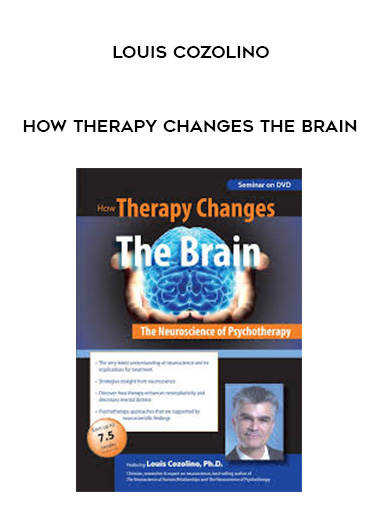HOW THERAPY CHANGES THE BRAIN – LOUIS COZOLINO
- The very latest understanding of neuroscience and its implications for treatment
- Strategies straight from neuroscience
- Discover how therapy enhances neuroplasticity and decreases mental distress
- Psychotherapy approaches that are supported by neuroscientific findings
We now know that all new learning depends on neuroplastic changes in the brain—the positive changes we see as a result of psychotherapy are no exception. Because of this, when you provide treatment and practice psychotherapy, you are an unwitting neuroscientist, optimizing plasticity though the caring relationships and the various techniques you employ in treatment.
Learn how to take full advantage of our new understanding of the brain to optimize the treatment you provide and improve the outcomes of your clients. Don’t miss this opportunity to understand neuroscience from one of the leading experts in the field. Dr. Louis Cozolino will provide you the very latest understanding and perspectives of psychotherapy and neuroscience.
- Explain how we unconsciously communicate with one another.
- Explain how biological processes translate human interactions into neural structures.
- Describe the mechanisms which translate early secure attachment into healthy adult experience.
- Describe how safe and trusting relationships enhance the neurobiological processes of learning and memory consolidation.
- List the commonalities among therapeutic modalities.
- Describe how evolution has made the brain more complex and vulnerable to dissociation between cognition and emotion.
GET HOW THERAPY CHANGES THE BRAIN OF AUTHOR LOUIS COZOLINO
The Social Brain and the Neuroscience of Human Relationships
- The emergence of the social brain
- The evolution of complexity
- Apoptosis and anaclitic depression
Bridging the Social Synapse
- The ways in which we are one
- The three messenger systems
- The social engagement system
Attachment, Epigenetics and Brain Building
- The networks of the social brain
- The power of early bonding
- How love becomes flesh
The Evolutionary Necessity of Psychotherapy
- The design flaws which make us vulnerable to mental distress
- Conservation and complexity
- The bias toward early learning
Neural Dissociation and Integration
- Bridging the hemispheric divide
- The tenacity of fear and the effects of stress hormones
- The speed and power of unconscious processing and projection
The Neuroscience of Psychotherapy
- The power of relationships to change the brain
- Creating a safe emergency and enhancing moderate states of arousal
- The activation of affect and cognition
The Psychotherapist as Neuroscientist
- The role of narratives in the evolution of the human brain
- The malleability of episodic memory
- Why neuroscience matters to psychotherapists?







